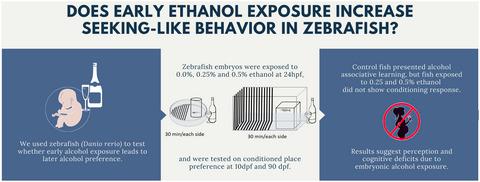当前位置:
X-MOL 学术
›
Int. J. Dev. Neurosci.
›
论文详情
Our official English website, www.x-mol.net, welcomes your feedback! (Note: you will need to create a separate account there.)
Does early ethanol exposure increase seeking-like behavior in zebrafish?
International Journal of Developmental Neuroscience ( IF 1.8 ) Pub Date : 2021-04-10 , DOI: 10.1002/jdn.10112 Jaquelinne Pinheiro-da-Silva 1 , Heloysa Araujo-Silva 1 , Ana Carolina Luchiari 1
International Journal of Developmental Neuroscience ( IF 1.8 ) Pub Date : 2021-04-10 , DOI: 10.1002/jdn.10112 Jaquelinne Pinheiro-da-Silva 1 , Heloysa Araujo-Silva 1 , Ana Carolina Luchiari 1
Affiliation

|
Fetal alcohol spectrum disorder (FASD) is the most common cause of birth defects. The severe variations are in fetal alcohol syndrome (FAS) but the most frequent cases are alcohol-related neurodevelopmental disorder (ARND), which is of a difficult diagnosis. ARND characteristics include impaired social behavior, anxiety and depression prevalence, cognitive deficits, and an increased chance for drug addiction. Here, we aimed to test whether early alcohol exposure leads to later alcohol preference. We hypothesize that early alcohol exposure increases the reinforcing effects on later experiences, raising the chance of addiction in adult life. Lately, the zebrafish has been a valuable model on alcohol research, allowing embryonic exposure and the study of the ontogenetic effects. For this, embryos were exposed to three different alcohol treatments: 0.0%, 0.25% and 0.5%, for 2 hr, at 24-hr post-fertilization. Then we evaluated the effects of embryonic alcohol exposure on conditioned place preference in two developmental stage: fry (10 days post-fertilization (dpf)) and young (90 dpf) zebrafish. Results show that control fish presented alcohol associative learning, which means, changes in place preference due to alcohol exposure, at both ontogenetic phases. However, zebrafish exposed to 0.25 and 0.5% alcohol during embryogenesis did not show conditioning response at any evaluated stage. These results suggest perception and cognitive deficits due to embryonic alcohol exposure that can alter alcohol responsiveness throughout a lifetime. Although low alcohol doses do not provoke malformation, it has been shown to induce several neurological and behavioral changes that are termed as Alcohol-Related Neurodevelopmental Disorders. These results may contribute to future investigations on how embryonic exposure affects the neurocircuitry related to perception and associative learning processing.
中文翻译:

早期接触乙醇会增加斑马鱼的寻觅行为吗?
胎儿酒精谱系障碍 (FASD) 是导致出生缺陷的最常见原因。胎儿酒精综合征 (FAS) 的严重变异,但最常见的病例是酒精相关的神经发育障碍 (ARND),这是一种难以诊断的疾病。ARND 的特征包括社会行为受损、焦虑和抑郁的流行、认知缺陷以及吸毒成瘾的机会增加。在这里,我们旨在测试早期接触酒精是否会导致后来的酒精偏好。我们假设早期接触酒精会增加对以后经历的强化作用,从而增加成年生活中成瘾的机会。最近,斑马鱼已成为酒精研究的一个有价值的模型,允许胚胎暴露和个体遗传效应的研究。为此,胚胎接受了三种不同的酒精处理:0。0%、0.25% 和 0.5%,持续 2 小时,在受精后 24 小时。然后我们评估了胚胎酒精暴露对两个发育阶段条件性位置偏好的影响:鱼苗(受精后 10 天 (dpf))和年轻的 (90 dpf) 斑马鱼。结果表明,对照鱼在两个个体发育阶段都表现出酒精联想学习,这意味着由于酒精暴露导致位置偏好的变化。然而,在胚胎发生过程中暴露于 0.25% 和 0.5% 酒精的斑马鱼在任何评估阶段都没有表现出调节反应。这些结果表明,由于胚胎酒精暴露导致的感知和认知缺陷会改变一生的酒精反应。虽然低剂量的酒精不会引起畸形,它已被证明会诱发多种神经和行为变化,这些变化被称为酒精相关神经发育障碍。这些结果可能有助于未来研究胚胎暴露如何影响与感知和联想学习处理相关的神经回路。
更新日期:2021-04-10
中文翻译:

早期接触乙醇会增加斑马鱼的寻觅行为吗?
胎儿酒精谱系障碍 (FASD) 是导致出生缺陷的最常见原因。胎儿酒精综合征 (FAS) 的严重变异,但最常见的病例是酒精相关的神经发育障碍 (ARND),这是一种难以诊断的疾病。ARND 的特征包括社会行为受损、焦虑和抑郁的流行、认知缺陷以及吸毒成瘾的机会增加。在这里,我们旨在测试早期接触酒精是否会导致后来的酒精偏好。我们假设早期接触酒精会增加对以后经历的强化作用,从而增加成年生活中成瘾的机会。最近,斑马鱼已成为酒精研究的一个有价值的模型,允许胚胎暴露和个体遗传效应的研究。为此,胚胎接受了三种不同的酒精处理:0。0%、0.25% 和 0.5%,持续 2 小时,在受精后 24 小时。然后我们评估了胚胎酒精暴露对两个发育阶段条件性位置偏好的影响:鱼苗(受精后 10 天 (dpf))和年轻的 (90 dpf) 斑马鱼。结果表明,对照鱼在两个个体发育阶段都表现出酒精联想学习,这意味着由于酒精暴露导致位置偏好的变化。然而,在胚胎发生过程中暴露于 0.25% 和 0.5% 酒精的斑马鱼在任何评估阶段都没有表现出调节反应。这些结果表明,由于胚胎酒精暴露导致的感知和认知缺陷会改变一生的酒精反应。虽然低剂量的酒精不会引起畸形,它已被证明会诱发多种神经和行为变化,这些变化被称为酒精相关神经发育障碍。这些结果可能有助于未来研究胚胎暴露如何影响与感知和联想学习处理相关的神经回路。

























 京公网安备 11010802027423号
京公网安备 11010802027423号